Cricket news: Mitch Marsh in frame to succeed Aaron Finch as T20 captain
Australia’s selectors faces a difficult call on who should Aaron Finch as T20 captain — but one name should be a clear standout, writes Ben Horne. Have your say here.
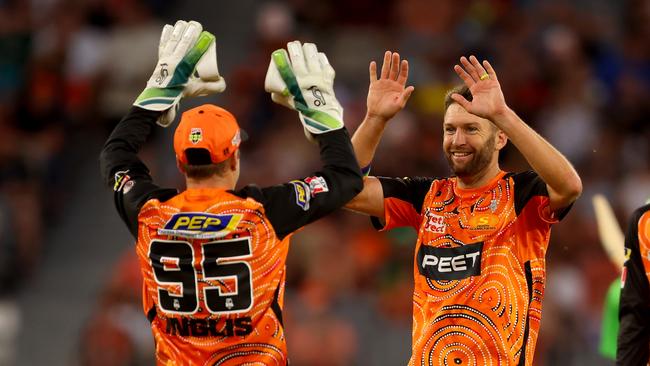
Big Bash
Don't miss out on the headlines from Big Bash. Followed categories will be added to My News.
It’s time for Mitchell Marsh to make the crucial transition from player on the rise to leader of the moment.
White ball great Aaron Finch’s retirement from international cricket on Tuesday, while anticipated, does present selectors’ with an intriguing decision over who to instil as Australia’s new Twenty20 captain ahead of next year’s World Cup.
Australia won’t rush into anything and a call may not be made until August when the T20 side will eventually play again in a series in South Africa.
Selectors might need that long to get a feel for how many of its experienced stars are likely to play on in white ball cricket after November’s 50-over World Cup.
But the standout option as things stand now should be M Marsh.
It seems as though Australia has been willing Marsh on since he captained the under 19s more than 12 years ago and he has matured into a natural, humble, if not somewhat reluctant leader of men.
Of course selectors will have plenty of options available to choose from.
Steve Smith has regenerated his T20 career after a blistering Big Bash. Josh Hazlewood is the second in command to Pat Cummins’ in the ODI side and is Australia’s best T20 fast bowler.
Adam Zampa and Glenn Maxwell might fancy doing the role, while Cummins could always take on the captaincy as a campaign specific mission for the T20 World Cup as he is with the 50-over edition this year.
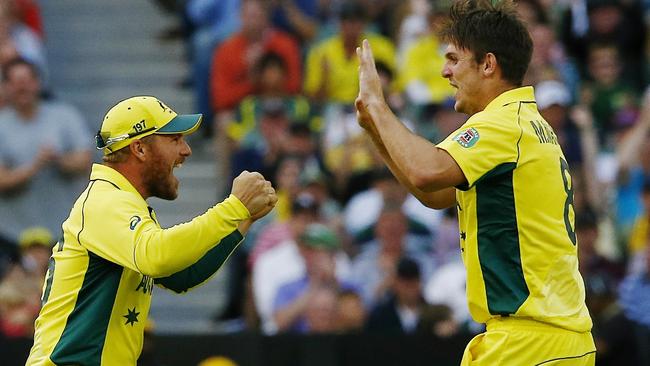
Ashton Turner could be thrust straight in as captain after his Perth Scorchers heroics, or Cricket Australia could even go ahead and rescind David Warner’s leadership ban if they so desired.
But Marsh at 31 years of age should tick the majority of boxes.
Cameron Green’s stunning rise means Marsh has probably played his last Test match unless injury strikes, which means Australia would be naming a captain who pour all his focus into white ball cricket at a time when the T20 team in particular needs more specialists.
Finch himself hinted he’d like to see a white ball specialist takeover.
Cummins may not captain the 50-over team past this year’s World Cup, in which case, Marsh could seamlessly take the reins of both white ball teams.
Marsh is a player who over the years has selflessly knocked back millions of IPL dollars to prioritise playing for Australia.
Despite the criticism he has copped through his career, he is as passionate and dedicated as they come.
A bit old school, but modern as well.
Captaincy is not a popularity contest, but Marsh is a bloke very hard to dislike and players gravitate to him.
There’s an inherent selflessness about Marsh where it’s always team first.
At the Big Bash final on Saturday night, he rode the Perth Scorchers home like he was actually playing.
Marsh is also an excellent T20 player and the only doubt over him being in the team, would be his body – which is perhaps the only mark against his name as a candidate.
But in a situation where Marsh missed the World Cup, that’s where you’d bring in an experienced vice-captain like a Smith, Turner or Cummins to fill the breach at minimal disruption.
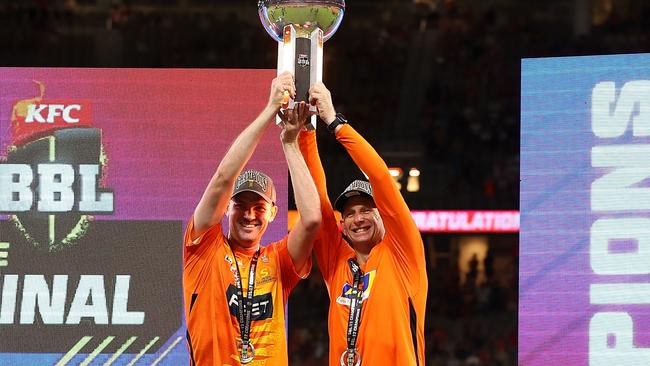
AUSTRALIA SHOULD HAVE SENT SCORCHERS TO WORLD CUP
They say a champion team is always better than a team of champions, and research claims Twenty20 cricket could be just the vehicle to prove it.
So with T20 by far Australia’s weakest format and the team at a crossroads following this summer’s World Cup failure … has a perfect storm arrived where selectors should consider making the Perth Scorchers the nucleus of the national side?
ANALYSIS: 12 BIGGEST TALKING POINTS OF BBL12
This bold question might make the eastern states turn bright orange, but it’s based on compelling data, which explains that the All Blacks are a rugby juggernaut largely because of the innate ‘cohesion’ its players have formed coming through together via a limited number of provincial clubs.
Cricket is of course a completely different sport to rugby, in that the collective unity of the group is very much secondary to individual skill.
But leading consultancy company Gain Line is adamant ‘cohesion analytics’ has a crucial role to play in the T20 format where every single ball is paramount to the outcome of the match.
Specifically, cohesive T20 teams gain a major advantage in defending totals — a facet of the game that can be make or break in a format where teams generally prefer to chase to win.
It’s no coincidence that when Gain Line — co-founded by Simon Strachan and former Wallaby Ben Darwin — last advised Cricket Australia about its T20 program back in 2018, the Perth Scorchers, with the stability of its roster, were at the forefront of its research, as they are now.
“High cohesion teams have the ability to defend their total better than low cohesion teams,” Strachan told News Corp.
“When we did this work in the BBL a few years ago, Perth was a natural standout in the system.
“They naturally drove high understanding through the way they recruited. You don’t get a lot of people coming in and out of Perth and that basically drove their system. They might have a bad year but they quickly come back up, which is indicative of a lot of other high cohesion environments, including Chennai in the IPL.
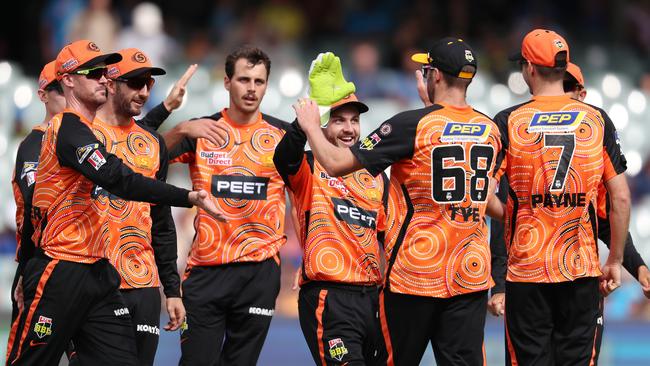
“Overall the trend in T20 cricket is if you win the toss you field first so you can bat second and control the chase.
“But if you lose the toss and you’re fielding second, higher cohesion teams have the ability to work better in that scenario and defend to win.
“What we found with T20 cricket specifically is how a level of understanding between players, drives the ability to withstand stress and pressure. Every one of the 120 deliveries is critical in the outcome of the game, and most critical for the team fielding second.
“Once you have that level of understanding, it drives a level of trust – so when you’re under pressure you can make correct decisions and effectively trust your teammate and perhaps most importantly, trust the captain.
“Even this season, if you look at Perth at the top of the ladder and the Melbourne Stars at the bottom; whether by choice or not, Perth fielded second four times and won three of those games. The poor old Melbourne Stars had to field second nine times and only won two.”

Gain Line’s research documents that the Wallabies fall from grace as a rugby superpower coincided with new domestic franchise teams the Western Force and Melbourne Rebels being introduced, which diluted the historical concentration of NSW, Queensland and ACT players in the Australian team.
The splitting of cricketers among eight Big Bash teams combined with the fact that between World Cups, Australia very rarely gets to field a consistent T20 side due to the unrelenting nature of the schedule – makes cohesion a difficult power to harness for selectors.
So why not a radical new model, where the Perth Scorchers became the centrepoint of the Australian T20 team?
Theoretically, the logic is flawed because cricket is more about the execution of individual skill than teamwork.
“I can choose my core group of Scorchers, but what if that means Steve Smith doesn’t get a run,” Strachan concedes.
But where the perfect storm element comes into play is Western Australia, and by proxy the Perth Scorchers, are currently the epicentre of talent production in Australian cricket – and the majority of the line-up either has played international cricket or is firmly in the conversation to do so.
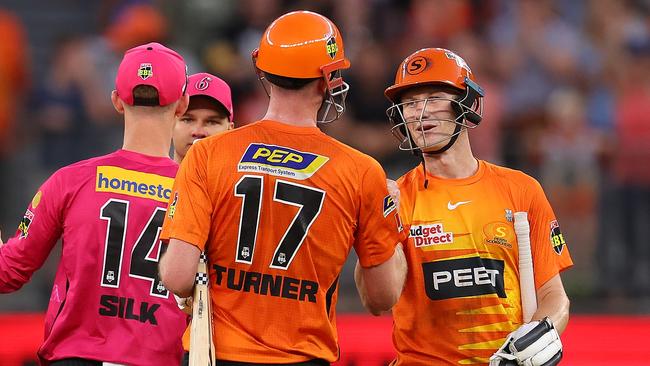
The core of the Scorchers side would not be out of place in Australian shirts and it would not cheapen the caps by picking them.
Also, it’s likely a number of Australian greats from the last World Cup may retire from T20 cricket or be moved on before next year’s tournament in the West Indies and the Caribbean.
Aaron Finch, Matthew Wade and the all-format fast bowlers Pat Cummins, Josh Hazlewood and Mitchell Starc are right on the edge, while Steve Smith, David Warner, Marcus Stoinis and Glenn Maxwell aren’t getting any younger either.
Few would argue against Australia urgently needing to move towards picking more T20 specialists, and if there are lineball calls on certain positions – perhaps selectors might consider favouring Scorchers over the rest, given what the data says about cohesion.
“Definitely. Because they walk in the room, they already have that shared understanding,” Strachan said.
“They already have the language between each other.
“So many games are decided by so few runs … (that cohesion) is sometimes the difference.
“If you can’t choose by skill, choose by understanding.”
More Coverage
Originally published as Cricket news: Mitch Marsh in frame to succeed Aaron Finch as T20 captain





